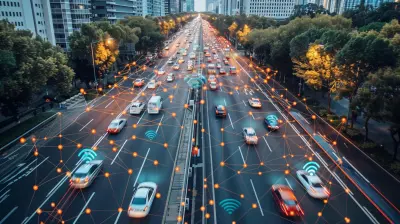The Rising Trend of Cyber Espionage and Its Global Implications
16 December 2024
In our increasingly interconnected world, the digital frontier has become the new battleground. No longer are spying and espionage confined to the shadowy alleys or backroom dealings of Cold War-era novels. Today, the virtual landscape is where many of the world's most significant battles are being fought. And one particular threat is rising faster than ever before: cyber espionage.
But what exactly is cyber espionage? How does it work, and why should we all be concerned about its global implications? Buckle up, because we’re diving deep into the murky waters of one of the biggest threats of the 21st century.

What is Cyber Espionage?
Cyber espionage is a type of cyberattack where unauthorized individuals or groups gain access to sensitive information from governments, corporations, or individuals. Think of it as a modern-day version of traditional espionage, but instead of sneaking into a building to steal documents, hackers are infiltrating online systems to capture data.Unlike the stereotypical "hacker" who might be interested in personal or financial gain, cyber spies are often looking for state secrets, intellectual property, or other strategic information. These digital spies can be acting on behalf of nation-states, corporations, or even criminal organizations.
In short, cyber espionage is all about stealing valuable, sensitive information—often without the victim ever realizing it.

The Evolution of Cyber Espionage
It wasn’t long ago that espionage required physical presence. Spies had to risk life and limb to sneak into enemy territory, plant bugs, or photograph classified documents. But the rise of the internet has revolutionized espionage, making it far less risky for the perpetrator and infinitely more damaging for the victim.In the early days of the internet, cyberattacks were relatively simple. You’d hear stories about a hacker breaking into websites or defacing pages. But as technology evolved, so did the methods of those looking to exploit it. Cyber espionage has grown more sophisticated, more dangerous, and more widespread. Today, entire state-sponsored groups are dedicated to this kind of activity.
From Small-Time Hackers to State-Sponsored Operations
Cyber espionage has shifted from being the domain of individual hackers to large, well-funded, state-sponsored operations. Countries like China, Russia, and North Korea (just to name a few) have been accused of orchestrating vast cyber espionage campaigns. But let’s not kid ourselves—Western nations, including the United States, have also been involved in their share of cyber intelligence gathering.These state-sponsored cyber espionage groups are often highly organized, well-funded, and exceptionally skilled. They don’t just target governments; they also go after corporations, research institutions, and even non-profits. The goal? To gather intelligence, steal intellectual property, or disrupt critical infrastructure.
The Techniques Used in Cyber Espionage
Cyber espionage isn’t a one-size-fits-all operation. It involves an array of techniques designed to infiltrate systems and exfiltrate valuable data. Some of the most common methods include:- Phishing Attacks: These are deceptive emails sent to trick individuals into providing sensitive information or installing malware.
- Advanced Persistent Threats (APTs): APTs refer to long-term targeted attacks where the perpetrator remains undetected within a network over an extended period.
- Zero-Day Exploits: These are attacks that exploit vulnerabilities in software that haven’t yet been patched or made public.
- Malware: Malicious software that can infiltrate systems, steal data, and even offer control of the system to the attacker.
These techniques are constantly evolving, making it difficult for organizations to stay ahead of the game. Every day, new vulnerabilities are discovered, and cyber spies are quick to take advantage.

The Global Implications of Cyber Espionage
Now that we have a basic understanding of what cyber espionage is, let’s look at the bigger picture. How does this growing trend affect the world? Spoiler alert: the implications are vast and unsettling.1. Threat to National Security
Perhaps the most obvious and alarming consequence of cyber espionage is its impact on national security. When state secrets, military plans, or intelligence operations are compromised, it can have devastating effects. Imagine if an adversary knew your country’s battle plans or had access to the inner workings of your critical infrastructure—scary, right?We’ve already seen multiple instances where cyber espionage has put national security at risk. For example, the infamous 2015 breach of the U.S. Office of Personnel Management resulted in the theft of sensitive personal data of over 22 million federal employees, including those with security clearances.
This isn’t just a problem for the U.S., either. Countries worldwide are at risk of having their most sensitive information compromised. And as cyber espionage techniques continue to evolve, it’s becoming harder for even the most well-protected nations to defend themselves.
2. Economic Impact and Corporate Espionage
Cyber espionage isn’t just a problem for governments. It’s a massive issue for businesses, too. Corporate espionage is a form of cyber spying where hackers target companies to steal trade secrets, intellectual property, or other valuable information.And the consequences can be catastrophic. Think about it—if a competitor gets access to your company's proprietary information, they could use it to outmaneuver you in the market or even destroy your business.
In fact, some studies estimate that cyber espionage costs the global economy hundreds of billions of dollars every year. And it’s not just the financial loss that businesses have to worry about. Cyber espionage can also lead to damaged reputations, lost customer trust, and regulatory penalties.
3. Strain on International Relations
Cyber espionage has also become a major source of tension between countries. Accusations of cyber spying can lead to diplomatic disputes, trade wars, and in some cases, even military confrontations.In 2020, for example, the U.S. and China were embroiled in a heated dispute over allegations of cyber espionage. The U.S. accused China of conducting wide-scale cyber spying campaigns targeting American companies and government agencies. Meanwhile, China denied the accusations and accused the U.S. of conducting its own cyber espionage activities.
And this is just one example. As more countries engage in cyber espionage, the potential for international conflict increases. Cyberattacks are difficult to trace, so it’s not always clear who’s responsible. This uncertainty can lead to misunderstandings, retaliatory attacks, and a breakdown in international cooperation.
4. Civil Liberties and Privacy Concerns
Another concerning implication of cyber espionage is its potential impact on civil liberties and privacy. As governments ramp up their cybersecurity efforts to combat cyber espionage, they may also increase surveillance on their own citizens.Take, for example, the revelations by whistleblower Edward Snowden, who exposed the extent of the U.S. government's surveillance programs. While these programs were designed to protect national security, they also raised significant concerns about privacy and the potential abuse of power.
As cyber espionage continues to grow, it’s likely that governments will implement even more invasive measures to protect themselves. And while these measures may be necessary, they also have the potential to erode our privacy and civil liberties.

How Can We Combat Cyber Espionage?
So, what can be done about cyber espionage? Unfortunately, there’s no magic bullet. Cyber espionage is a complex and evolving threat, and defending against it requires a multi-faceted approach.1. Strengthening Cybersecurity Measures
The most obvious way to combat cyber espionage is to improve cybersecurity. Organizations and governments need to implement robust security measures, including firewalls, encryption, and regular software updates. However, technology alone isn’t enough. Training and awareness are equally important. Employees need to be educated about the risks of phishing scams and other tactics used by cyber spies.2. International Cooperation
Cyber espionage is a global problem, and it requires a global solution. Countries need to work together to establish norms and regulations for cyberspace. The development of international treaties and agreements could help prevent cyberattacks and hold nations accountable for cyber espionage activities.3. Punishing Perpetrators
Finally, it’s important to hold perpetrators accountable. When cyber espionage is traced back to a specific individual or nation-state, there must be consequences. This could include sanctions, criminal charges, or retaliatory cyberattacks.Of course, identifying the perpetrators of cyber espionage is easier said than done. Cyberattacks are notoriously difficult to trace, and attackers often go to great lengths to cover their tracks. But with improved technology and international cooperation, it’s possible to hold cyber spies accountable for their actions.
Conclusion
Cyber espionage is more than just a buzzword. It's a real, growing threat that affects governments, businesses, and individuals worldwide. The increasing sophistication of cyber espionage operations—combined with the global reliance on digital infrastructure—means that this issue isn’t going away anytime soon.From threats to national security to the potential erosion of civil liberties and privacy, the implications of cyber espionage are vast and far-reaching. And while we may not be able to prevent every cyberattack, we can take steps to protect ourselves and mitigate the damage.
The digital age has brought us incredible advancements, but it has also opened the door to new threats. As we continue to navigate this complex landscape, one thing is clear: cyber espionage is here to stay.
all images in this post were generated using AI tools
Category:
CybersecurityAuthor:

Gabriel Sullivan
Discussion
rate this article
22 comments
Nell Ward
Cyber espionage is like watching a spy movie, but instead of tuxedos and gadgets, it’s just hackers in pajamas sipping coffee. Who’s got popcorn?!
April 6, 2025 at 3:35 AM

Gabriel Sullivan
Great analogy! Cyber espionage may lack the glamour of spy movies, but its impact on global security is very real and demands our attention.
Vance Romero
Exciting insights! Understanding cyber espionage helps us stay vigilant and secure in our digital world!
March 18, 2025 at 8:30 PM

Gabriel Sullivan
Thank you! Staying informed is crucial to enhancing our defenses against cyber threats.
Tessa Wilson
Cyber espionage isn’t just a tech issue; it's a global chess game where every move can redefine alliances and shift the balance of power.
February 2, 2025 at 7:51 PM

Gabriel Sullivan
Absolutely, cyber espionage is a complex interplay of technology and geopolitics that can reshape international relations and power dynamics.
Rebecca Daniels
Great article! It's crucial to understand the implications of cyber espionage in today's interconnected world. Thank you for shedding light on this pressing issue—looking forward to more insights on how we can protect our digital landscape!
January 27, 2025 at 8:31 PM

Gabriel Sullivan
Thank you for your thoughtful comment! I'm glad you found the article helpful. Stay tuned for more insights on protecting our digital landscape!
Luma Hughes
Fascinating insights! Cyber threats affect us all daily!
January 21, 2025 at 4:35 AM

Gabriel Sullivan
Thank you! Absolutely, the pervasive nature of cyber threats underscores the importance of global awareness and collaboration.
Iliana Rios
Cyber espionage is becoming a major threat worldwide. As technology evolves, so do tactics. It's crucial for governments and companies to adapt and enhance their security measures.
January 17, 2025 at 3:28 AM

Gabriel Sullivan
Absolutely, the evolution of cyber threats requires constant vigilance and innovation in security protocols to protect sensitive information at all levels.
Marissa Brooks
Cyber espionage is increasingly prevalent, posing significant risks to national security and economic stability. As nations invest in advanced cyber capabilities, global cooperation is essential to mitigate threats and protect sensitive information.
January 14, 2025 at 4:43 AM

Gabriel Sullivan
Thank you for highlighting the crucial need for global cooperation in addressing cyber espionage. It's vital for nations to unite in protecting national security and economic stability amidst these rising threats.
Wilder Cole
The surge in cyber espionage poses significant risks to national security and corporate integrity. As nation-states increasingly leverage sophisticated hacking techniques, the implications extend beyond stolen data to geopolitical tensions. Organizations must bolster their cybersecurity measures to safeguard sensitive information and maintain competitive advantages in this evolving landscape.
January 10, 2025 at 12:09 PM

Gabriel Sullivan
Thank you for your insightful comment! I completely agree that the rise in cyber espionage presents serious challenges to both national security and corporate integrity, highlighting the urgent need for enhanced cybersecurity measures.
Mira Hayes
Great article! It's fascinating yet unsettling to see how cyber espionage is evolving. The implications for global security are immense, and it really emphasizes the need for robust cybersecurity measures. Staying informed and proactive is crucial in this digital age. Thanks for shedding light on such an important topic!
January 5, 2025 at 5:30 AM

Gabriel Sullivan
Thank you for your thoughtful comment! I’m glad you found the article engaging and relevant—staying vigilant in our cybersecurity efforts is indeed essential.
Taryn Benson
As cyber espionage escalates, we stand at a critical crossroads. Awareness and innovation are our greatest weapons against this invisible threat. Let’s unite to fortify our defenses, protect our digital sovereignty, and ensure a secure future for generations to come. The time to act is now!
January 1, 2025 at 11:35 AM

Gabriel Sullivan
Absolutely! Strengthening awareness and innovation is essential in combating cyber espionage. Together, we can safeguard our digital future.
Thornewood Luna
Cyber espionage poses significant threats to national security, economic stability, and personal privacy globally. Awareness is crucial.
December 28, 2024 at 11:33 AM

Gabriel Sullivan
Thank you for highlighting the critical impact of cyber espionage. Awareness is indeed essential for safeguarding our national security and personal privacy in this digital age.
Emily Kirkland
Essential insights, thanks for sharing!
December 21, 2024 at 1:34 PM

Gabriel Sullivan
Thank you for your kind words! I'm glad you found it insightful.
Madison Willis
This article effectively highlights the increasing threat of cyber espionage and its far-reaching consequences. It’s crucial for governments and companies to prioritize cybersecurity measures and develop strategies to counteract these sophisticated attacks in an interconnected world.
December 20, 2024 at 12:57 PM

Gabriel Sullivan
Thank you for your insightful comment! I completely agree that prioritizing cybersecurity is essential in addressing the growing threat of cyber espionage.
Jasmine Garcia
This article provides a timely and insightful overview of cyber espionage's growing impact on global affairs. The analysis of its implications for national security and international relations is particularly compelling. It serves as a crucial reminder of the need for heightened vigilance and cooperation among nations to mitigate these threats.
December 20, 2024 at 4:04 AM

Gabriel Sullivan
Thank you for your thoughtful feedback! I'm glad you found the analysis compelling and relevant. Your emphasis on vigilance and cooperation is essential in addressing these challenges.
Ariella McIntire
This topic is crucial; understanding cyber espionage is vital for global security today.
December 19, 2024 at 9:44 PM

Gabriel Sullivan
Thank you for your comment! I completely agree—cyber espionage poses significant threats that require our urgent attention to enhance global security.
Zevonis Fields
This article effectively highlights the escalating threat of cyber espionage, emphasizing its profound impact on national security and international relations. Understanding these dynamics is crucial for individuals and organizations to bolster defenses against this pervasive digital menace.
December 18, 2024 at 7:34 PM

Gabriel Sullivan
Thank you for your insightful comment! I'm glad you found the article effective in addressing the critical issue of cyber espionage and its implications for national security.
Brandon McVicar
Cyber espionage: the ultimate high-tech spy game! Who knew global intrigue could be just a few clicks away? 💻🔍
December 18, 2024 at 3:45 AM

Gabriel Sullivan
Absolutely! Cyber espionage is redefining the landscape of global intelligence and security, highlighting the need for stringent measures against these silent threats.
Liam McKinstry
Great article! Cyber espionage poses significant challenges to global security and privacy. It's essential to foster international cooperation to address these growing threats effectively.
December 17, 2024 at 1:35 PM

Gabriel Sullivan
Thank you for your comment! I completely agree—international cooperation is crucial in tackling the challenges posed by cyber espionage.
Mabel Love
This article highlights the urgent need for robust cybersecurity measures as cyber espionage becomes increasingly sophisticated. Organizations must prioritize threat intelligence and employee training to mitigate risks. Understanding the global implications of these attacks is crucial for fostering international collaboration and enhancing collective cybersecurity efforts.
December 17, 2024 at 6:00 AM

Gabriel Sullivan
Thank you for your insightful comment! I completely agree that prioritizing cybersecurity measures, threat intelligence, and employee training is essential in combating the growing threat of cyber espionage.
Tyler Dodson
Cyber espionage: where secrets are cheap, but the consequences are priceless. Stay woke!
December 16, 2024 at 9:00 PM

Gabriel Sullivan
Thank you for your insightful comment! Indeed, the balance between cost and consequence in cyber espionage highlights its profound global impact. Staying vigilant is essential in this evolving landscape.
Vera Lewis
What are the most surprising tactics used in cyber espionage today, and who’s behind them?
December 16, 2024 at 1:47 PM

Gabriel Sullivan
Surprising tactics in cyber espionage include social engineering, zero-day exploits, and deepfake technology. State-sponsored actors, including nations like China, Russia, and North Korea, are often behind these tactics, leveraging advanced technology and psychological manipulation to achieve their goals.
Daphne Hunter
Understanding the complexities of cyber espionage empowers us to innovate and strengthen our defenses. Together, we can foster a safer digital landscape, turning challenges into opportunities for collaboration and growth in the tech world!
December 16, 2024 at 3:40 AM

Gabriel Sullivan
Thank you for your insightful comment! Emphasizing collaboration is crucial as we navigate the complexities of cyber espionage and work towards a safer digital future.
MORE POSTS

How IoT Devices are Shaping the Future of Home Security

The Future of eSIMs: Simplifying Connectivity Everywhere

How Blockchain is Shaping the Future of Data Security

How Automation Is Streamlining Data Center Operations

The Role of AI in Healthcare Gadgets: A New Era of Wellness

How IoT is Changing the Face of Indoor Farming

Cloud Security Certifications: Why They Matter for Your Business

How IoT-Connected Devices are Revolutionizing Transportation

The Next Big Leap in Wearable Tech
How to Use Your Fitness Tracker to Improve Your Posture

What the Metaverse Means for the Future of Social Media

Exploring the Ethical Implications of Augmented Reality

Tech Conferences That Are Defining the Future of Work